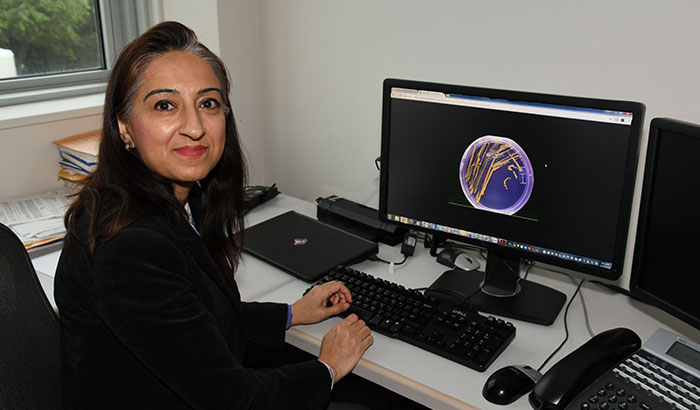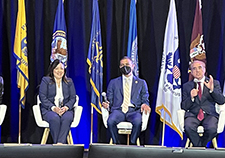Office of Research & Development |
 |


Dr. Nasia Safdar and colleagues at the Madison VA are studying intestinal bacteria in Veterans with Gulf War illness. (Photo by Donald Lewis)
June 12, 2018
By Mike Richman
VA Research Communications
Bacteria in the gastrointestinal tract—the organ that takes in food, digests it, and discharges the waste—are key to maintaining health by providing energy, nutrients, and protection from infections and diseases.
In fact, the body’s largest immune reservoir lives in the human gut, which carries more than 10 trillion bacteria, including at least 1,000 species.
"Because Gulf War illness resembles health conditions like chronic fatigue syndrome, we thought there may be a connection between the gut microbiota and Gulf War illness."
Research has shown that a lack of bacterial diversity in the gut could lead to such illnesses as irritable bowel syndrome, which causes gastrointestinal tract (GI tract) pain, diarrhea, constipation, abdominal bloating, and bowel urgency. What does this mean for Veterans with Gulf War illness (GWI), a chronic, multi-symptom health problem that is marked by fatigue, pain, cognitive issues, and gastrointestinal symptoms, including irritable bowel syndrome?
Scientists at the William S. Middleton Memorial Veterans Affairs Medical Center in Madison, Wisconsin, are seeking to find out. To learn if Vets with GWI have problems with their gut bacteria, a research team plans to compare 26 Veterans with Gulf War illness with 26 who are healthy in a pilot study.
Dr. Nasia Safdar, an infectious disease specialist at the Madison VA, is leading the project. She’s being assisted by Dr. Julie Keating, a research health scientist at the Madison VA. They hypothesize that the Veterans with GWI will have less diverse gut bacteria than the Vets without the multi-symptom illness.
The study will be among the first to examine the gut microbiota—the complex community of microorganisms in the GI tract—in Gulf War Veterans.

AI to Maximize Treatment for Veterans with Head and Neck Cancer

VA opens new research center to seek novel arthritis treatments

Under Secretary of Health, panel of experts discusses PACT Act impacts for Veterans

VA researcher works to improve antibiotic prescribing for Veterans
“Recent studies have found that there are differences in the bacteria that reside in the gut of people with chronic, multi-symptom illnesses like chronic fatigue syndrome, compared with healthy people,” Safdar says. “Bacteria in the gastrointestinal tract can affect the central nervous system, suggesting that these bacteria can impact symptoms inside and outside of the gut that are commonly reported by many Gulf War Veterans. Because Gulf War illness resembles health conditions like chronic fatigue syndrome, we thought there may be a connection between the gut microbiota and Gulf War illness.”
She adds that mouse models of Gulf War illness used in the lab show abnormal colonies of microorganisms in the gut.
“This is very promising data, suggesting that the gut microbiota may differ in Veterans with Gulf War illness,” she says. “Our study will build on this work by studying the gut microbiota in Gulf War Veterans, with and without Gulf War illness symptoms. We expect to find that the Veterans with Gulf War illness will have less diverse gut bacteria, with differences in the most common kinds of bacteria, compared with Veterans who do not have these symptoms.”
By the end of the study, Safdar and her team expect to be in position to design a clinical trial to investigate probiotics as a way to help Veterans with symptoms of Gulf War illness. Probiotics, “friendly” bacteria that are intended to have health benefits, especially in the digestive system, are a hot topic in the medical community. These live microorganisms, widely used as dietary supplements or in nutritional foods, are a low-cost, well-tolerated, non-antibiotic treatment strategy.
Studies have shown that probiotics can slow down the spread of pathogens, taking over areas of the gut and thereby pushing out unhealthy bacteria. The research team believes that treatment with probiotics will help restore in Veterans with GWI a more diverse gut bacteria population that may ease their symptoms.
Safdar, who is also an associate professor at the University of Wisconsin, has long been interested in new ways of reducing health care infections, such as the use of probiotics. She says in order to study whether probiotics may help Vets with GWI, she and her colleagues first must understand if differences exist in the gut microbiota of those Veterans and, if so, what those differences are.
“Understanding those differences will help us identify the most appropriate probiotics for future studies that look into their effects on Veterans with Gulf War illness,” Safdar says. “For example, a probiotic that contains a specific kind of bacteria may be the most effective in targeting Gulf War illness. By the end of this study, we’ll find out if studying the ability of probiotics to reduce Gulf War illness symptoms is a worthwhile question and, if so, how to set up a study to best answer that question.”
An estimated 300,000 Veterans have Gulf War illness, a complicated disease that affects various organs, most notably the brain. Research has shown that few therapies substantially improve pain and fatigue for GWI symptoms without major side effects, including exacerbating cognitive symptoms.
In Safdar’s two-year pilot study, the researchers plan to collect stool samples to compare the gut microbiota of the participants. They’ll extract bacterial DNA from the samples and identify the genetic sequence of the bacteria. By comparing these sequences with the sequences of known bacterial DNA, the researchers will be able to identify the different kinds of bacteria in the gut.
DNA is a molecule that is critical for the storage and reading of genetic information.
“Certain populations of bacteria are more common in people with Gulf War illness, compared with people who are healthy,” Safdar says. “That’s what we’re interested in. Sequencing for bacterial DNA is going to tell us that.”
The researchers will also collect blood samples to look for markers of inflammation and immune function. A sluggish immune system and an overactive one can both be bad signs, according to Safdar.
“Studies have found that the gut microbiota can activate immune responses, and that Veterans with Gulf War Illness may have more active immune and inflammatory responses,” Safdar explains. “Gathering data on immune system activity in these Veterans is another piece of the puzzle to how the gut microbiota may be playing a role in Gulf War Illness.”
Ultimately, Safdar and her team hope the study will advance the understanding of the causes of Gulf War illness symptoms, especially the role of abnormal gut microbiota and its effects on fatigue. The researchers are interested in fatigue because it seems to be the GWI symptom that limits quality of life the most and because few therapies address it, Safdar says.
“The gastrointestinal system is our focus,” she says. “But because of the connection between the gut and the brain, we think if we intervene in the gut, assuming that we find differences in the gut microbiota, then that will also help in addressing the symptoms of Gulf War illness. Fatigue is a big one.”
VA Research Currents archives || Sign up for VA Research updates